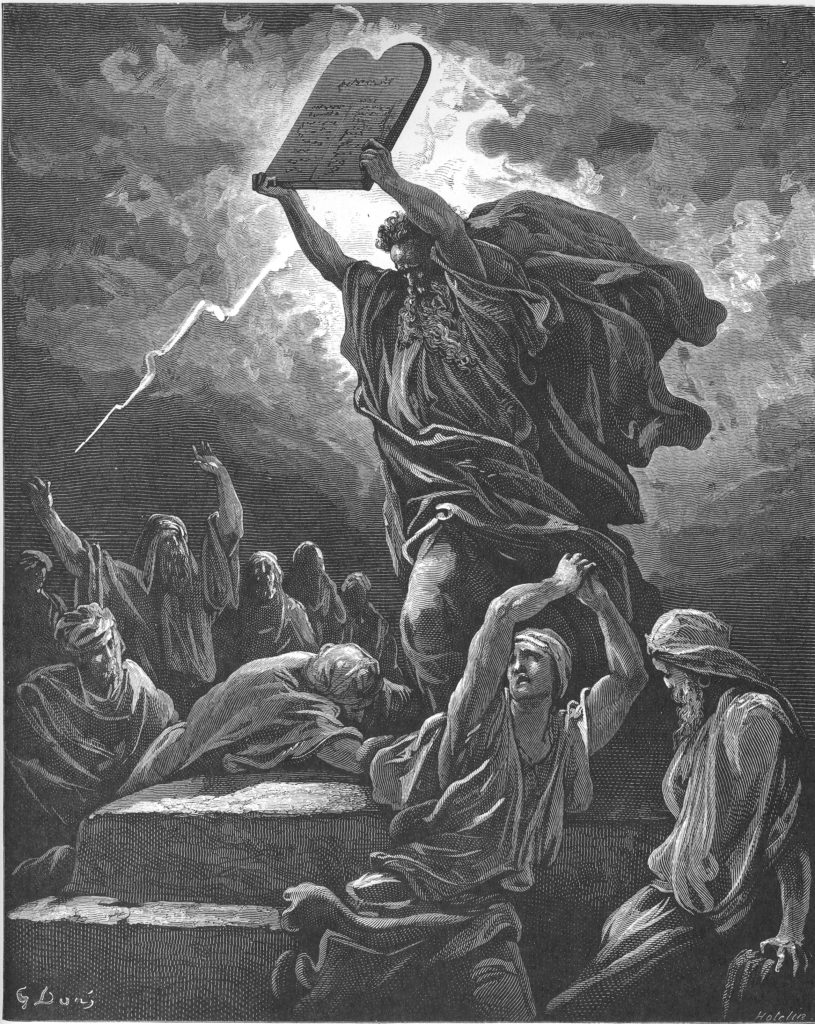Christians, Your Neighbors Donât Get Godâs Law
Professing Christians: why, in all our stories, songs, sermons, and conversations, do we keep assuming our non-Christian neighbors think like us?
Why do we assume non-Christians especially understand two key Christian concepts?
Iâm speaking about two key concepts in particular: law and grace.

We just keep assuming we can refer to Godâs law, and non-Christian neighbors will get it. Or we assume we can refer to Godâs grace, and non-Christian neighbors will really get it.
In both cases, we reveal our naĂŻvetĂ©. We betray the fact that weâre culturally sheltered.
Letâs look at one recent example, thanks to a statement by Franklin Graham.1 In this May 15 post, Graham asked readers, âWhat would you take a bullet for? What are the principles and beliefs that you would not compromise under any circumstances? Even if it meant putting your life on the line?â
He went on to refer to a biblical account in the book of Daniel. Then he concluded:
I want to call on every Christian and every pastor to stand firm like these patriarchs of old and not bow to the secular, increasingly godless culture in which we liveâeven when (not if) weâre criticized, mocked, and labeled intolerant. The God of the Old Testament that delivered Shadrach, Meshach, and Abednego from their fiery execution is the same God todayâand He is still more than able to save. Will you stand against ungodliness? What are you willing to take a bullet for?
A few disclaimers.
First, Graham is clearly writing this for Christians only.
Second, there is a time to address people âinside the clubhouse,â without painstakingly explaining every reference and definition to people who are listening in at the windows.2
We arenât always in The World. We get to have âsubculturesâ just like everyone else.
But here Graham seems to have forgotten something: Heâs not in the clubhouse. Heâs on Facebook. He has the little blue-check at his name; heâs a public figure. And when youâre even a Christian semi-public figure, you cannot assume non-Christians think like you.
1. Non-Christians do not understand Godâs Law
Graham makes this assumption when he talks about âpatriarchs,â without being wise about knowing how this word has been negatively charged. He also mentions alien names like Blenfwoof, Ermaderd, and Jingunvish (this is how non-Christians hear them).
But he and his many supporters in the comments section3 fail to understand this fact:
Non-Christians do not understand Godâs Law, including sin, death, and repentance.
Godâs Law is His standard of holiness. Itâs His moral perfection. Itâs not defined by laws of the universe or nature, or any ârulesâ outside of Himself. Itâs defined by Himself in Person.
Godâs Law (which can be upper-cased) is seen across the Bible: in legal code and in song.
But our non-Christian neighbors do not have a clue what Godâs Law is, what Christians believe about it, or why it matters for the universe. This means that when our stories, songs, and comments reference Godâs Law, they make no sense to non-Christian neighbors.
I can read this Graham supporterâs comment and understand the code. Maybe you can, too:
There is the judgement side of God too , when he comes back to judge at the great white throne !! The sheep and the goats , the unbelievers !! He isn’t just love, but wants to be our Savior and Lord !! And will condemn the unbelievers to everlasting fire !! 😊. Remember he disciplines those he loves !!
But to the non-Christian neighbor, itâs nothing but jargon. Or worse, it looks like this:
God is a hater. He personally hates you and judges you on his great white shark. Animal references for some reason. I personally hate unbelievers. God isnât love. Spiritual talk. God hates you and wants you to burn in hell. That makes me happy. He wants to abuse you, like the parental abuse youâve experienced or heard about.
So whatâs the solution? How else do Christians assume their non-Christian neighbors understand the biblical concepts of Godâs Law, along with concepts like sin, death, hell, and repentance? How can Christians better communicate the truth of Godâs Law, by using Scripture first and foremost, but also echoing this truth through our stories and songs?
Tomorrow Iâll explore another growing problem: Christians who assume non-Christian neighbors only feel false guilt from âlegalistsâ and will therefore easily understand grace.


































 everal done stateside as well. Despite my copious amount of ink, I have never had any trouble finding a white-collar job, and in fact, I have never once had anyone say anything negative about my tattoos to me directly.
everal done stateside as well. Despite my copious amount of ink, I have never had any trouble finding a white-collar job, and in fact, I have never once had anyone say anything negative about my tattoos to me directly.




 In some ways, Tosca Lee needs no introduction. She burst onto the writing scene in 2007 with Demon: A Memoir, a C.S. Lewis-ish tale about a writer named Clay who encounters a demon who has chosen him to write his life story.
In some ways, Tosca Lee needs no introduction. She burst onto the writing scene in 2007 with Demon: A Memoir, a C.S. Lewis-ish tale about a writer named Clay who encounters a demon who has chosen him to write his life story. Most pertinent to writers who are considering attendance at Realm Makers, Tosca Lee continues to garner praise for her writing. The endorsers for The Progeny said such things as “Tosca Lee is a masterful storyteller”; “Lee is a phenomenal talent known for bringing history to the present, making it exciting and relevant while never forgetting that love is the ultimate motivator”; “Gifted storyteller Tosca Lee artfully weaves an intriguing centuries-old legend into an absorbing, fast-paced supernatural thriller”; “Tosca puts the thrill into thriller,” and much more.
Most pertinent to writers who are considering attendance at Realm Makers, Tosca Lee continues to garner praise for her writing. The endorsers for The Progeny said such things as “Tosca Lee is a masterful storyteller”; “Lee is a phenomenal talent known for bringing history to the present, making it exciting and relevant while never forgetting that love is the ultimate motivator”; “Gifted storyteller Tosca Lee artfully weaves an intriguing centuries-old legend into an absorbing, fast-paced supernatural thriller”; “Tosca puts the thrill into thriller,” and much more.



 Avoid vague/overused adjectives about how the novel will make me feel (âa thrilling storyâ or âa page-turnerâ). Even genre terms like âspeculativeâ can seem more like the language of industry pitches and not broad reader appeals. Show not tell, and all that.
Avoid vague/overused adjectives about how the novel will make me feel (âa thrilling storyâ or âa page-turnerâ). Even genre terms like âspeculativeâ can seem more like the language of industry pitches and not broad reader appeals. Show not tell, and all that.
 Marketing tips?
Marketing tips?
 Christian symbols such as crosses or churches; warding off vampires with holy water or crucifixes; fighting demons with Catholic rites, Latin phrases, holy water, crucifixes, etc. Symbols can be divorced from their original meaning, and Christianity has, if I may put it this way, entered into the lore of vampires and demons. Modern writers who draw upon the lore of these mythical creatures may employ the Christian bits in it, but these bits do not always carry either Christian truth or a Christian spirit. Elements of Christianity may be cut off from the whole of Christianity, and then they are fractured and dead, like branches cut off from a vine. A crucifix or those impressive Latin phrases can even be used in a magical or superstitious way, spiritual power that comes from things rather than God.
Christian symbols such as crosses or churches; warding off vampires with holy water or crucifixes; fighting demons with Catholic rites, Latin phrases, holy water, crucifixes, etc. Symbols can be divorced from their original meaning, and Christianity has, if I may put it this way, entered into the lore of vampires and demons. Modern writers who draw upon the lore of these mythical creatures may employ the Christian bits in it, but these bits do not always carry either Christian truth or a Christian spirit. Elements of Christianity may be cut off from the whole of Christianity, and then they are fractured and dead, like branches cut off from a vine. A crucifix or those impressive Latin phrases can even be used in a magical or superstitious way, spiritual power that comes from things rather than God.


 For some years Kathy’s writing was on hiatus because of personal and family issues. She was widowed in 2004; went back to school at Regent College in Vancouver, BC, where she received two degrees in Christians Studies; worked with classical guitarist Christopher Parkening on his autobiography; and remarried in 2014.
For some years Kathy’s writing was on hiatus because of personal and family issues. She was widowed in 2004; went back to school at Regent College in Vancouver, BC, where she received two degrees in Christians Studies; worked with classical guitarist Christopher Parkening on his autobiography; and remarried in 2014.






 Starbucks has done much to add value to their coffee experience.
Starbucks has done much to add value to their coffee experience.

